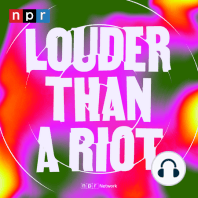52 min listen

What doesn't kill you makes you a strong Black woman: Rico Nasty
What doesn't kill you makes you a strong Black woman: Rico Nasty
ratings:
Length:
51 minutes
Released:
May 18, 2023
Format:
Podcast episode
Description
Rico Nasty's music creates a haven for heavy emotions. And in a world that paints Black girls showing any emotion as too much, having a place to release anger and anxiety is essential. But when Rico joined the 2021 Playboi Carti tour, his fans harassed her repeatedly and that safety was stripped away. On this episode, we talk with Rico about keeping a brave face, hear from a fan who was there in the crowd, and ask: When the outlet for your anger is shut down, how do you get your power back?
Released:
May 18, 2023
Format:
Podcast episode
Titles in the series (28)
The Conspiracy Against Hip-Hop: Why are hip-hop and mass incarceration so entangled in America? How did they become that way? A mysterious letter sends us back in time to find out. by Louder Than A Riot